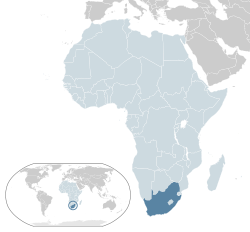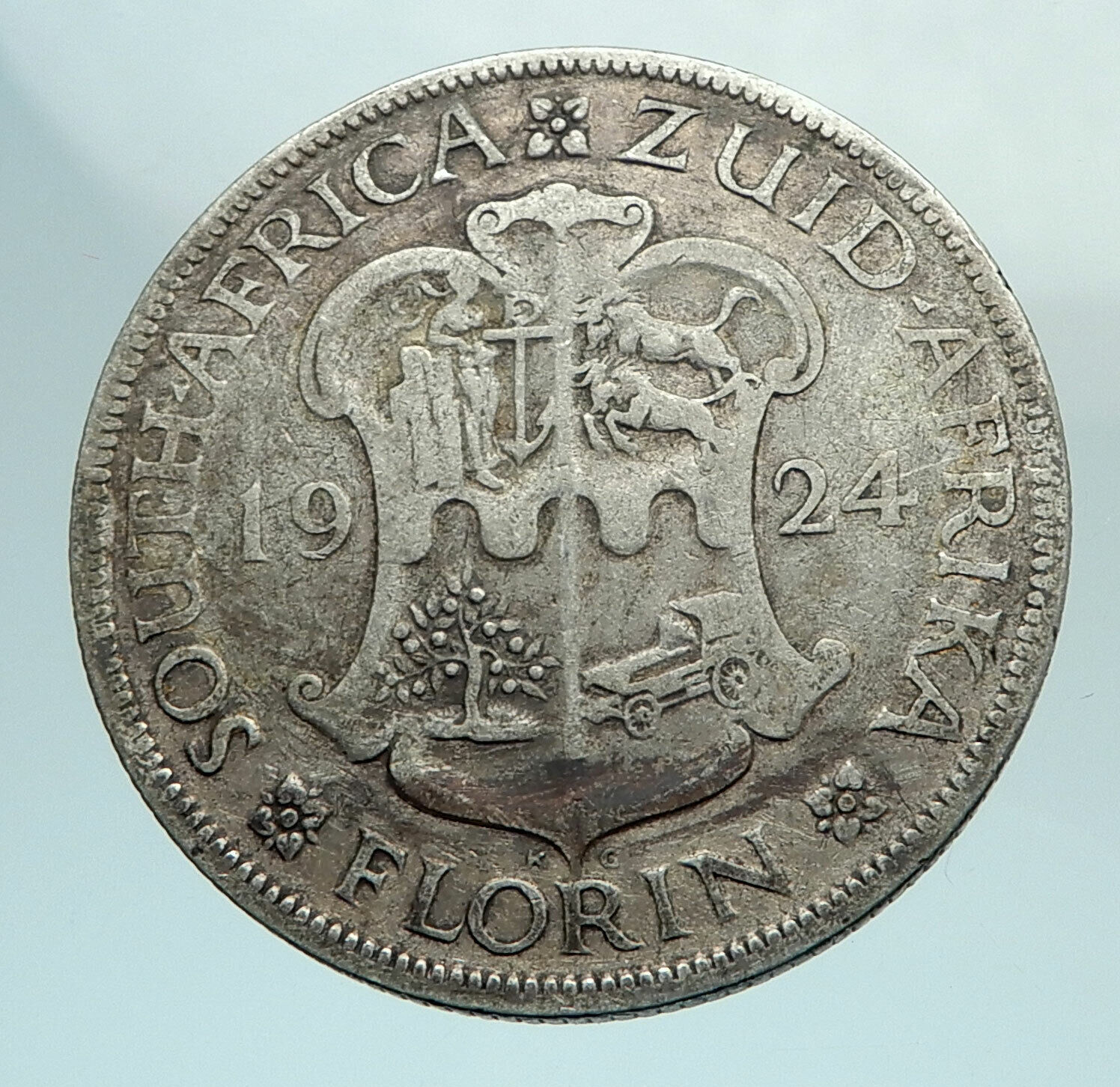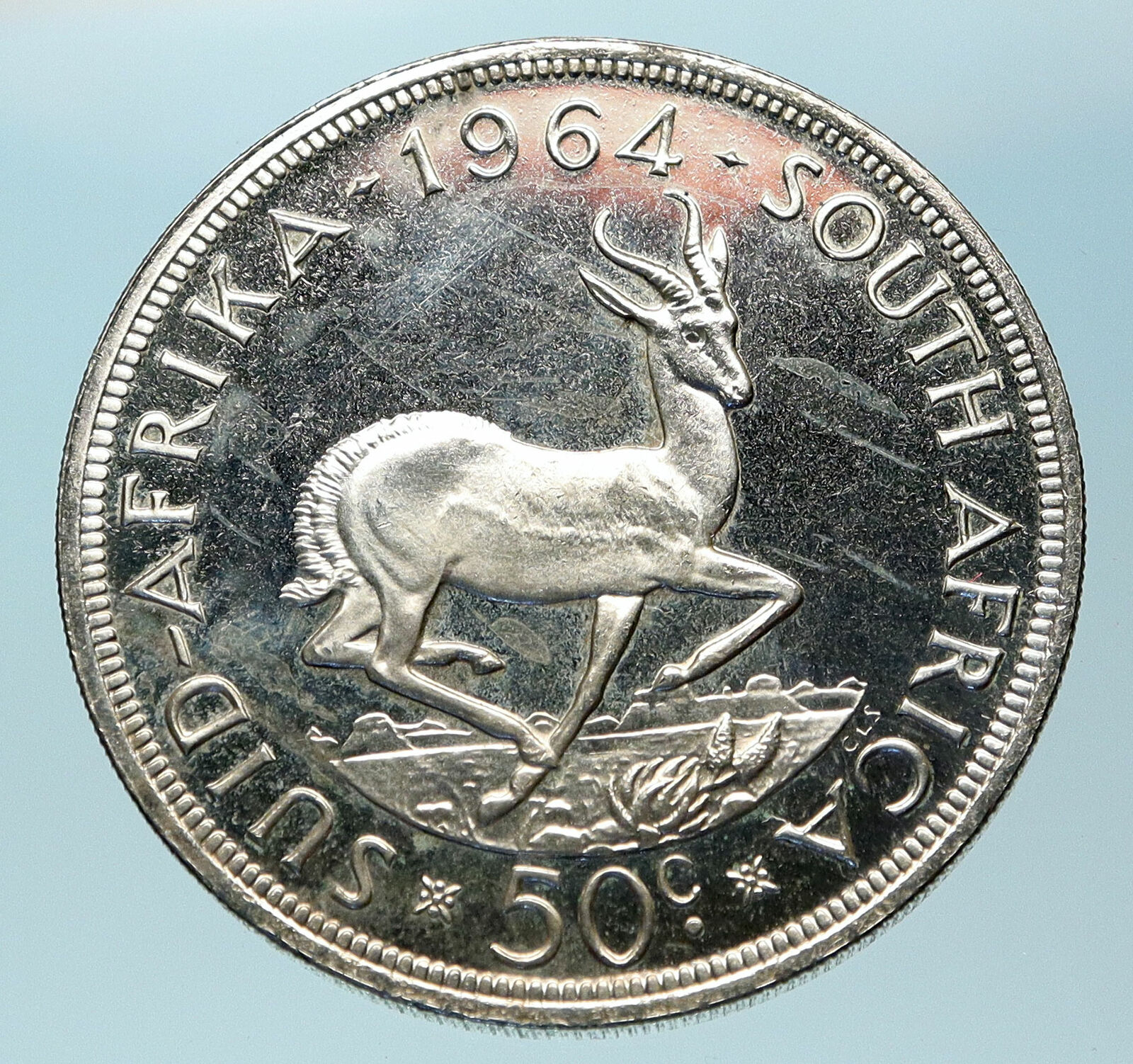|
South Africa
The End of Theophilus Ebenhaezer Dönges’ Presidency
1969 Silver Shilling 31mm (15.03 grams) 0.800 Silver (0.3858 oz. ASW)
Reference: KM# 80.1
SOUTH AFRICA 1969 T.S., Dr. T.E. Dönges bust right, English legend
1 R UNITATE T.S., National arms between value
You are bidding on the exact item pictured, provided with a Certificate of Authenticity and Lifetime Guarantee of Authenticity.
Theophilus Ebenhaezer (‘Eben’) Dönges (8 March 1898 – 10 January 1968) was a South African politician who was elected State President of South Africa, but died before he could take office, aged 69.
Early life
Eben Donges was born on 8 March 1898 in the town of Klerksdorp, the youngest son of Theophilus C. Dönges, a minister of religion. He attended Stellenbosch University and received a law degree from the University of London. He was admitted to the Middle Temple on 23 November 1921 and withdrew without being Called to the Bar on 8 November 1928. When he returned from London, he became active in the National Party and joined its mouthpiece, Die Burger, as a journalist. He left journalism in 1927 and practised law.
Career
Running for parliament, he was unsuccessful in his first attempt in 1938 before obtaining a seat in 1941. He became a National Party cabinet member in 1948 serving as Minister of Posts and Telegraphs. Dr Dönges was a senior member of the National Party which ruled South Africa from 1948 to 1994. As Minister of the Interior, from 1948 to 1961, he was one of the so-called “architects” of apartheid, introducing race-based population registration, and removing Coloured voters from the common voters’ roll as a prelude to disenfranchising them altogether. During his tenure as Minister of the Interior, Dönges believed that apartheid would continue only for the next two generations. In November 1953, after DF Malan resigned as Cape Provincial leader, Dönges defeated Eric Louw to become the new provincial leader.
In the 1958 National Party leadership election following the death of Prime Minister J. G. Strijdom, Dönges ran for the party leadership and lost to Hendrik Verwoerd in the final round of voting between the two candidates. Despite running in opposition to Verwoerd for the office of Prime Minister, he was still included in the new cabinet and served as the Minister of Finance from 1958 to 1966. After the assassination of Prime Minister Verwoerd, Dönges became acting Prime Minister on 6 September 1966 until a National Party congress named B. J. Vorster to succeed to the premiership.
Dönges was elected to the titular office of State President to succeed C.R. Swart on his retirement on 1 June 1967, but suffered a stroke and fell into a coma before he could take office. He died on 10 January 1968 without regaining consciousness. His deputy Tom Naudé acted for him until 6 December 1967 when he officially replaced Dönges.
Legacy
He received the posthumous honours granted to a former State President: a state funeral and his effigy on the following year’s coins. There is a school in Cape Town named after him, Eben Dönges High School and another primary school in Bothaville, Eben Dönges Primary School, as well as the Eben Dönges Hospital in Worcester.
 South Africa, officially the Republic of South Africa (RSA), is the southernmost country in Africa. It is bounded on the south by 2,798 kilometres (1,739 mi) of coastline of Southern Africa stretching along the South Atlantic and Indian Oceans; on the north by the neighbouring countries of Namibia, Botswana, and Zimbabwe; and on the east and northeast by Mozambique and Swaziland; and surrounds the kingdom of Lesotho. South Africa is the 25th-largest country in the world by land area, and with close to 56 million people, is the world’s 24th-most populous nation. It is the southernmost country on the mainland of the Old World or the Eastern Hemisphere. About 80 percent of South Africans are of Sub-Saharan African ancestry, divided among a variety of ethnic groups speaking different Bantu languages, nine of which have official status. The remaining population consists of Africa’s largest communities of European (white), Asian (Indian), and multiracial (coloured) ancestry. South Africa, officially the Republic of South Africa (RSA), is the southernmost country in Africa. It is bounded on the south by 2,798 kilometres (1,739 mi) of coastline of Southern Africa stretching along the South Atlantic and Indian Oceans; on the north by the neighbouring countries of Namibia, Botswana, and Zimbabwe; and on the east and northeast by Mozambique and Swaziland; and surrounds the kingdom of Lesotho. South Africa is the 25th-largest country in the world by land area, and with close to 56 million people, is the world’s 24th-most populous nation. It is the southernmost country on the mainland of the Old World or the Eastern Hemisphere. About 80 percent of South Africans are of Sub-Saharan African ancestry, divided among a variety of ethnic groups speaking different Bantu languages, nine of which have official status. The remaining population consists of Africa’s largest communities of European (white), Asian (Indian), and multiracial (coloured) ancestry.
South Africa is a multiethnic society encompassing a wide variety of cultures, languages, and religions. Its pluralistic makeup is reflected in the constitution’s recognition of 11 official languages, which is among the highest number of any country in the world. Two of these languages are of European origin: Afrikaans developed from Dutch and serves as the first language of most white and coloured South Africans; English reflects the legacy of British colonialism, and is commonly used in public and commercial life, though it is fourth-ranked as a spoken first language. The country is one of the few in Africa never to have had a coup d’état, and regular elections have been held for almost a century. However, the vast majority of black South Africans were not enfranchised until 1994. During the 20th century, the black majority sought to recover its rights from the dominant white minority, with this struggle playing a large role in the country’s recent history and politics. The National Party imposed apartheid in 1948, institutionalising previous racial segregation. After a long and sometimes violent struggle by the African National Congress and other anti-apartheid activists both inside and outside the country, discriminatory laws began to be repealed or abolished from 1990 onwards.
Since 1994, all ethnic and linguistic groups have held political representation in the country’s democracy, which comprises a parliamentary republic and nine provinces. South Africa is often referred to as the “Rainbow nation” to describe the country’s multicultural diversity, especially in the wake of apartheid. The World Bank classifies South Africa as an upper-middle-income economy, and a newly industrialised country. Its economy is the second-largest in Africa, and the 34th-largest in the world. In terms of purchasing power parity, South Africa has the seventh-highest per capita income in Africa. However, poverty and inequality remain widespread, with about a quarter of the population unemployed and living on less than US$1.25 a day. Nevertheless, South Africa has been identified as a middle power in international affairs, and maintains significant regional influence.
|





 South Africa, officially the Republic of South Africa (RSA), is the southernmost country in Africa. It is bounded on the south by 2,798 kilometres (1,739 mi) of coastline of Southern Africa stretching along the South Atlantic and Indian Oceans; on the north by the neighbouring countries of Namibia, Botswana, and Zimbabwe; and on the east and northeast by Mozambique and Swaziland; and surrounds the kingdom of Lesotho. South Africa is the 25th-largest country in the world by land area, and with close to 56 million people, is the world’s 24th-most populous nation. It is the southernmost country on the mainland of the Old World or the Eastern Hemisphere. About 80 percent of South Africans are of Sub-Saharan African ancestry, divided among a variety of ethnic groups speaking different Bantu languages, nine of which have official status. The remaining population consists of Africa’s largest communities of European (white), Asian (Indian), and multiracial (coloured) ancestry.
South Africa, officially the Republic of South Africa (RSA), is the southernmost country in Africa. It is bounded on the south by 2,798 kilometres (1,739 mi) of coastline of Southern Africa stretching along the South Atlantic and Indian Oceans; on the north by the neighbouring countries of Namibia, Botswana, and Zimbabwe; and on the east and northeast by Mozambique and Swaziland; and surrounds the kingdom of Lesotho. South Africa is the 25th-largest country in the world by land area, and with close to 56 million people, is the world’s 24th-most populous nation. It is the southernmost country on the mainland of the Old World or the Eastern Hemisphere. About 80 percent of South Africans are of Sub-Saharan African ancestry, divided among a variety of ethnic groups speaking different Bantu languages, nine of which have official status. The remaining population consists of Africa’s largest communities of European (white), Asian (Indian), and multiracial (coloured) ancestry.




